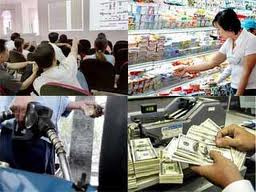VietNamNet Bridge – The US dollar depreciation in recent days and the low
demand show an ominous sign: the enterprises’ production capacity and the
consumer market are weakening.

As such, the dollar price has decreased again since June 6, just after four days
of slightly increasing.
Le Duc Tho, Deputy General Director of Vietinbank, said the dollar unexpectedly
increased by 170 dong per dollar, or 0.8 percent, in early June because of the
increased demand at that moment, when some foreign currency loans were due and
borrowers needed dollars to pay debts. Meanwhile, there has been no big demand
for dollar in the long term, which explains why the dollar price has fallen down
again.
Also according to Tho, the current dong and the dollar interest rates have been
kept in the harmonization to ensure that it would be more profitable to deposit
dong than dollars.
Dollar depositors can get the interest rate of 2 percent per annum. Supposed
that the price slippage in 2012 is 2-3 percent, one would see that it is more
profitable to deposit dong to enjoy the interest rate of 9 percent per annum,
than depositing dollars.
In case the dong deposit interest rates would decline further, the dollar
interest rate would also be lowered in order to be sure that dong keepers always
have advantages over dollar.
Eximbank’s General Director Truong Van Phuoc explained that the dong and dollar
credit growth has been slowing down due to the production stagnation, and once
the demand for dollar loans decreases, the dollar prices would decrease as well.
However, observers still can point out some unusual things in the dong/dollar
exchange rate performance. In May, the dollar appreciated significantly in the
first four days of the month, partially because of the sharp decreases of the
dong deposit interest rates.
In principle, when the dong deposit interest rates decrease, people would buy
dollars instead of keeping dong, because the dong deposits cannot bring the
profits high enough. Therefore, the dollar price would increase.
Meanwhile, currently, the dollar has been depreciating continuously in the
context of the dong deposit downward, which should be seen as an abnormal thing?
Answering the question, Le Xuan Nghia, a well-known economist, said businesses
are still facing a lot of difficulties. Since their export markets have been
narrowed, they have decreased the imports of materials, which has led to the
weak dollar demand.
The low dollar demand has had bigger influences on the dollar market than the
high demand for financial speculation, which has resulted in the downward trend
of the dollar price.
Besides, Nghia said, maybe the State Bank has stopped or reduced the dollar
purchases, which has led to the dollar price decrease.
In general, Nghia said, the foreign currency market performance shows the
picture of Vietnam’s economy, where the enterprises’ production capacity and
consumer market both are weakening. The dollar price in the black market were
sometimes higher than the official exchange rates quoted by banks, which shows
that the imports, especially the imports across the border gate, have decreased
due to the low domestic demand.
Source: SGTT
- © Copyright of Vietnamnet Global.
- Tel: 024 3772 7988 Fax: (024) 37722734
- Email: evnn@vietnamnet.vn